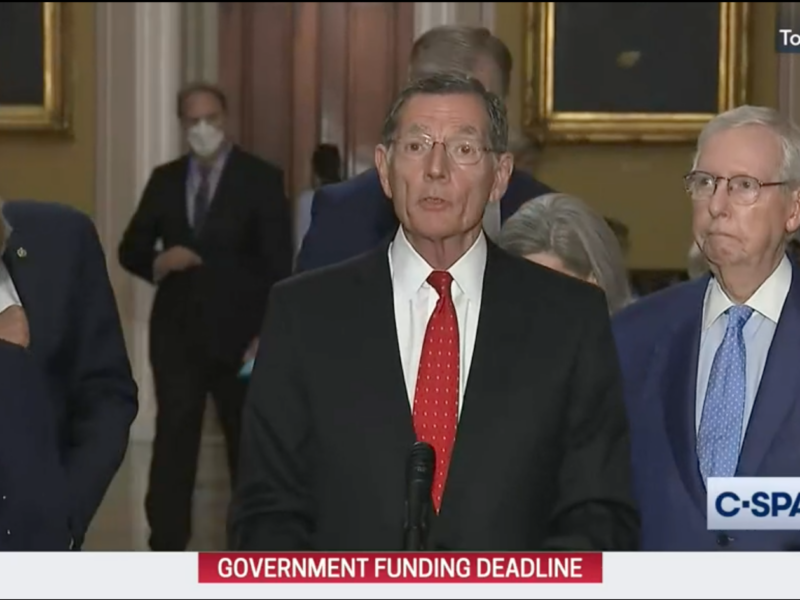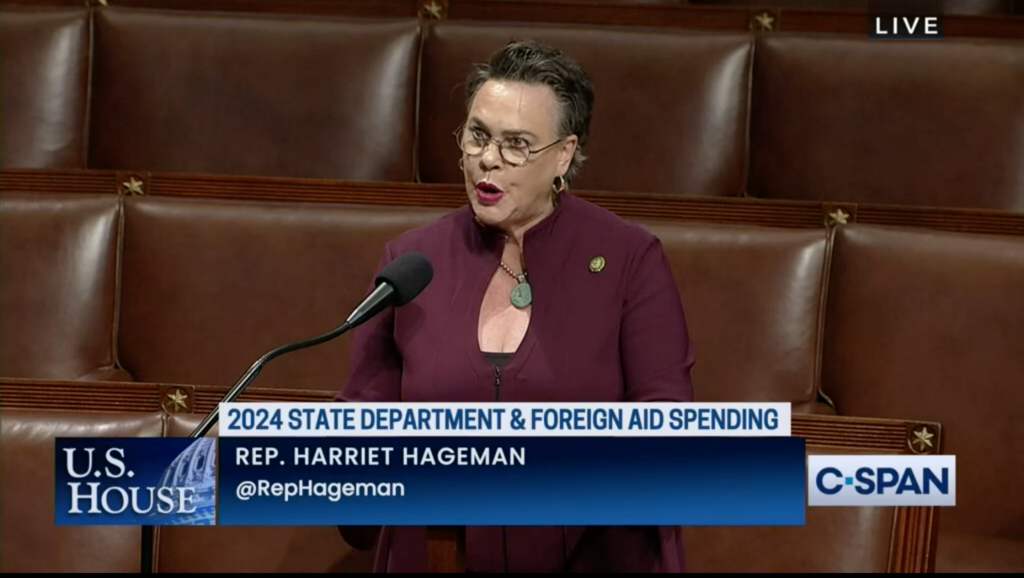SHUTDOWN SHOWDOWN: Imminent Funding Deadline Approaching With No Resolution in Sight
Wyoming lawmakers split on path to fund government in short term
- Published In: Politics
- Last Updated: Sep 29, 2023

Wyoming's congressional delegation is split on how to address short-term government funding ahead of a shutdown looming this weekend. (Photo via C-SPAN)
By Jacob Gardenswartz
Special to the Wyoming Truth
This story has been updated to correct the passage of legislation on Sept. 29, 2023 at 9:30 MT.
WASHINGTON — Federal appropriations for fiscal year 2023 expire at midnight on Saturday, and with lawmakers nowhere close to an agreement on a path to fund the government beyond that, a shutdown appears all-but-guaranteed at this point.
Leaders of both parties said they hope to avoid such an outcome. On Thursday, the Senate moved closer to a short-term solution with a series of procedural votes on a continuing resolution (CR) to extend government funding at its current levels through Nov. 17.
But though the motions passed on an overwhelmingly bipartisan basis, they were not unanimous: around 20 Republicans — Wyoming Sen. Cynthia Lummis among them — voted against moving forward with the resolution. And absent unanimous consent of all 100 U.S. Senators, the upper chamber’s rules ensure a vote on final passage won’t come for several days, well after funding expires.
In the House, prospects appear far worse. Even if the Senate manages to pass a CR before the deadline, House Speaker Kevin McCarthy has remained noncommittal about whether he’d bring it up for a full vote on the floor. In the meantime, far-right lawmakers have waged an all-out war on GOP leadership, refusing to back any short-term spending measure until the House has considered each of the 12 long-term government appropriation bills.
And despite McCarthy’s previous agreement with President Joe Biden establishing spending levels for this year, Republicans are pushing for steeper cuts. The Speaker said Thursday he’d bring his own version of a short-term CR — ripe with significant budget cuts and border security initiatives — to the floor on Friday, though it remains unclear whether he has enough support in his own conference to pass it. Even if he does, the measure would be dead-on-arrival in the Democratically-controlled Senate.
All the while, the top Republicans in each chamber continue to point fingers at one another and duck blame as the shutdown deadline ticks closer.

“This is the way the game is played in the Senate: they’ll sit around and wait ‘til the midnight hour, and they’ll find enough votes to cobble together 70 votes maybe, to just keep things going down the track where the train is going to run into a wall,” House Majority Leader Steve Scalise (R-La.) told reporters. “That’s not leadership. Somebody’s got to take the reins and say we’re going to address the problems facing this country.”
“I don’t want to give the Speaker any advice about how to run the House,” Senate Minority Leader Mitch McConnel (R-Ky.) shot back in a news conference. “We’re going to concentrate on trying to do our job here in the Senate, which I think is to pass a bill that keeps the government open, and I can’t have an impact on what happens in the House.”
At stake are not just political points and lawmakers’ schedules but U.S. economic and national security. A shutdown would mean cuts to millions of Americans’ food assistance and furloughs for hundreds of thousands of government employees. The last and thus-far longest government shutdown, which took place in late 2018 and early 2019, cost the U.S. economy roughly $8 billion, according to the nonpartisan Congressional Budget Office.
Even those workers who are deemed “essential” — air traffic controllers, TSA officials and active duty military members, for example — would be forced to work without pay, something sure to impact morale and recruitment according to the Biden administration.
“The consequences will be severe,” a senior administration official told reporters at a background briefing this week. “Depending on how long a shutdown lasts, it could have a significant deleterious effect on national security and our readiness.”
Wyoming lawmakers appear split on short-term funding
Wyoming’s congressional delegation is in lock-step about government funding in the long term: they want deep spending cuts, domestic energy production incentives and more funding for border security. But in the short term, Wyoming lawmakers appear split.
In the Senate, where procedural votes on the CR have helped signal Senators’ positions, Lummis split with Sen. John Barrasso (R-Wyo.) by opposing moving forward with a short-term stopgap.
“The deficit doubling to $2 trillion in the last year should be a flashing red warning sign to everyone who cares about America’s future,” she wrote on X, the site formally known as Twitter. “Our nation is quickly approaching a debt death spiral that will bury future generations. We need to end Washington’s spending addiction.”
But as a member of GOP leadership, Barrasso has been torn between his populist Wyoming base and his fellow Senate leaders hoping to avoid an embarrassing shutdown. He voted to advance the short-term CR twice so far, though he’s sought to frame his support as necessary to ensure border security.
“The American people deserve better — they deserve a government that is open and works for them,” Barrasso told reporters Wednesday. “They deserve a government that is open and a border that is closed, which is why Republicans will be working on amendments and on what we’re dealing with on the floor now.”
Indeed, Senators met behind closed doors for several hours on Thursday, working to craft a border addition to their funding extension which might help it earn more GOP support. Such efforts have yet to come to fruition, however, and the inclusion of $6 billion in aid to Ukraine makes those prospects even more unlikely.
On the House side, Rep. Harriet Hageman (R-Wyo.) has mostly shied away from speaking out on the short-term funding debate. She’s been vocal and active as lawmakers debate long-term appropriation bills, including those concerning the Departments of Defense, Homeland Security and State which narrowly passed the House late Thursday — offering up amendments forcing government workers back to the office, withholding funding from the World Health Organization, cutting climate initiatives and limiting electronic tracking of cattle, among others.
But Hageman has not participated in the war of words between House conservatives and McCarthy, and her office has declined multiple requests to elaborate on her views on the funding debate.
Still, Hageman signaled how she might vote on a short-term measure should one come to the floor in an email to supporters earlier this week.
“For too long our government has spent money it does not have, ballooning the national debt and threatening the nation’s future… This financial situation is not sustainable and something must be done,” she wrote. “I am opposed to any long- or short-term resolution that continues to fund our government at the spendthrift levels set by Democrats last year. We are also united about including H.R. 2, the Secure the Border Act, as part of any bill package. ”
House Republican whips will likely count Hageman in the “no” column on short-term funding absent steep spending cuts and border security measures the would never clear the Senate.
The takeaway: bring on a shutdown.













